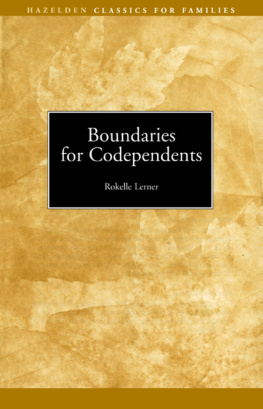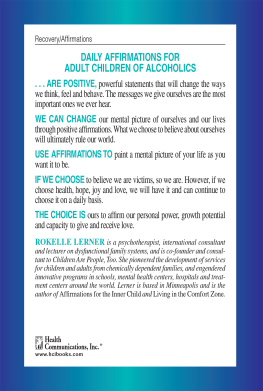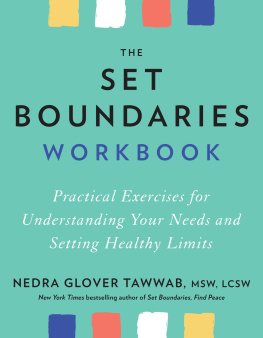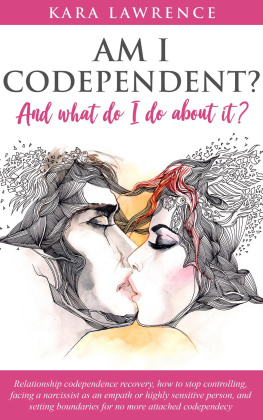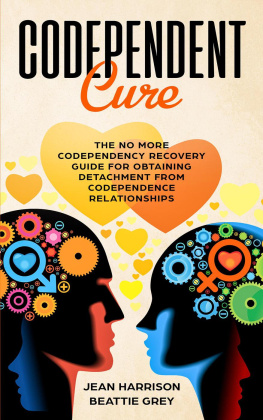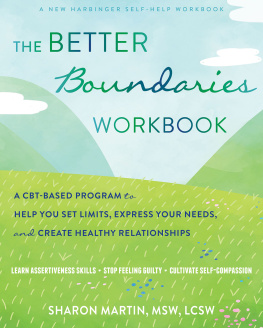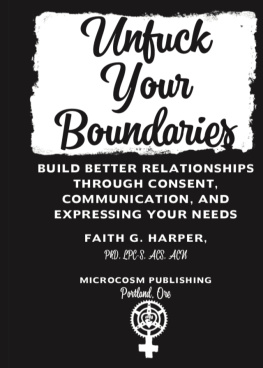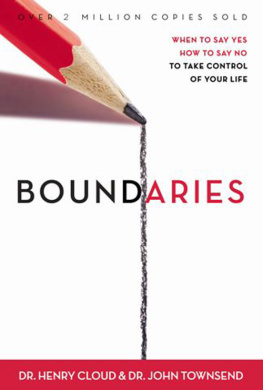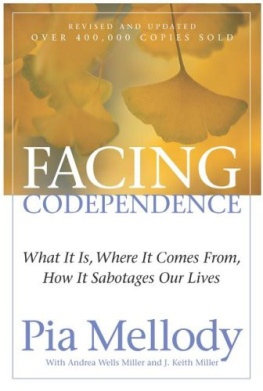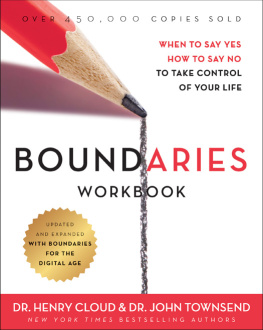So much of recovery from codependence has to do with figuring out where we stop and another person begins. Growing up in an alcoholic or dysfunctional family often prevents us from creating healthy physical, emotional, intellectual, and spiritual boundaries. This pamphlet offers meaningful insight on how to build healthy boundaries.
Rokelle Lerner is a founding board member of the National Adult Children of Alcoholics organization. She lectures internationally on how to develop treatment services for the alcoholic family.
First published August, 1988.
Copyright 1988, Hazelden Foundation.
All rights reserved. No portion of this publication may be reproduced in any manner without the written permission of the publisher.
Printed in the United States of America.
What Are Boundaries?
Boundaries are our sense of ourselves, and our perception of how we are different from others physically, intellectually, emotionally, and spiritually. Boundaries exist for our protection. Our boundaries are not fixed; they change with what we feel and the people we are with.
When our boundaries are intact, we know that we have separate feelings, thoughts, and realities. Our boundaries allow us to know who we are in relation to others around us. We need our boundaries to get close to others, since otherwise we would be overwhelmed.
Boundaries ensure that our behavior is appropriate and keep us from offending others. When we have healthy boundaries, we also know when we are being abused. A person without boundaries will not know when someone is physically, emotionally, or intellectually violating them.
This phenomenon is common to codependents in general, and adult children of alcoholics in particular, which may account for why so many tend to remain in abusive situations.
Developing boundaries is a core issue for codependents in recovery and nowhere is this more dramatically illustrated than in adult children of alcoholics. They need to understand and develop boundaries in order to fully recover and claim their identities.
For the first eighteen months of life, children have no clear idea of who they are and depend entirely on their mother and father for basic needs. During the terrible twos a child begins to push away from parents, learns cause and effect thinking, and develops the important skill of saying, No, I wont! and You cant make me. In this important stage of development, children test others around them so they can begin to answer What is and is not under my control? Will others still care for me if I think for myself? Where do I stop and you begin? These questions must be answered for children to clarify their boundaries.
Children of Alcoholics
According to Dr. Stanley Keleman, author of Your Body Speaks Its Mind, if children do not say no, they never affirm themselves. If they dont form and maintain boundaries, they become victimized. Often, saying no and I wont are the strongest expressions of self-affirmation a child can make.
These assertions protect children and allow them to see themselves as separate from their parents. Healthy mothers and fathers respect this important developmental stage. In chemically dependent families, however, children must adapt to their parents. It is because of this forced adaptation that children of alcoholics often develop a focus outside of themselves.
In many alcoholic families, personal space is invaded and emotions are not clearly defined or accepted. Attention is focused on the alcoholic parent, not the children, who learn to match what they feel to the mood swings of the parent. In other words, if Mom is the alcoholic and Mom is happy, then the children are happy. When children focus on their parents and neglect themselves, they never develop the inner resources that help them to know how to feel, think, or behave in a given situation. This is the essence of codependency and a damaged boundary system.
Children raised in alcoholic familes, for example, may learn quite early that getting angry, having tantrums, and saying no are dangerous. For this reason, children of alcoholics may come to view anger as something to avoid, and separation as disloyalty. They may never quite learn where their boundaries end and anothers begin.
If Mom is angry, the children assume they have caused it. If Mom is depressed, the children are depressed and tiptoe around the house. These children may never clearly find their emotional boundaries and have difficulty deciding whose feelings belong to whom.
When children hear phrases such as, You drive me to drink! or If it werent for you kids, I wouldnt have to take these pills! they tend to respond to them as if they were true. They dont yet have the ability to evaluate these types of situations. Young children who take these statements literally often come to believe that if they were more studious, perfect, well-behaved, or attractive, their parents would not be alcoholic.
For this reason, these children often develop a sense of responsibility for their parents welfare that unfortunately does not always diminish over time or with maturity. This sense of over-responsibility results in painful relationships and instills a deep sense of shame for basic human failures.
Its no wonder that children raised with unpredictable, abusive parents are confused about their thoughts, feelings, and behavior. Its crucial for children of alcoholics to understand the idea of boundaries if they are to reclaim the emotional, physical, intellectual, and spiritual parts of themselves.
How Are Boundaries Violated?
No parent consciously destroys a childs boundary system. In fact, boundaries are often damaged in the name of love by parents who lack a clear sense of themselves or do not understand the importance of allowing their children to set limits.
Alcoholic families are usually emotionally, physically, and intellectually abusive. It is important to remember, however, that this abuse can occur in any family where children are raised by anxious, unpredictable parents. Parents affected by compulsive behavior or addiction often lack a clear sense of themselves and are likely to raise children with the same problem. Children raised with undependable parents often become adults with damaged boundaries. The most obvious form of boundary violation occurs in the form of physical abuse or neglect.
Physical Boundaries
We get to know our physical comfort zones through our physical boundaries. When we have healthy physical boundaries, we can determine how close others should come to us. It also means we can determine how and when we want to be touched, and who we will allow to touch us. It means we give that right to others.
Physical boundaries are most often violated by physical violence, incest, or neglect. Children who are touched inappropriately by parents must deny their discomfort and repulsion in order to survive the abuse in the family. If a father makes sexual advances toward his daughter, shell probably learn to ignore the sensation of her skin crawling, her stomach tying in knots, and having to hold her breath in order not to feel. It is precisely the turning off or ignoring of these responses that will make her vulnerable to problems in the future. She may even abuse her own children.
Our bodies and emotions tell us when someone is violating our space. But many children with alcoholic parents learn to distrust their senses and their emotions. They often ignore bizarre events and treat crises as if they were normal.

